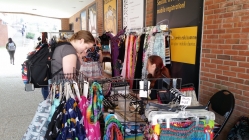
If you’ve spent any time around The Commons, you’ve probably noticed a woman selling scarves, clothes and jewelry in the breezeway. She shows up sporadically, but her merchandise is consistent: hats and gloves in the winter, dresses and shorts in the spring, rings and bracelets all year long. Her name is Denise Helou, though she is known by many names.
“I had a student at St. Mary’s College come up to me and call me ‘the hippie lady,'” she says as she neatly sorts through a pile of tapestries that are stacked next to her table. “If I had to label myself as anything, I would say that I’m a roving vendor. A traveling merchant of sorts.”
Students stop and peruse her wares as they make their way to their classes. Two girls giggle to one another as they try on rings, pursing their lips and determining which accessory best suits them before slipping them onto their fingers and admiring them. Helou assists another student examining a long floral dress, explaining that it is a “double-layer wrap skirt” that can be worn in a number of different styles.
Helou has been in this business for over 20 years, traveling around to different colleges and universities in Maryland, DC, Virginia and Pennsylvania. When she first started her business, she sold homemade things – mostly journals and other paper goods – which she primarily sold in markets. Moving her store to college campuses changed her customer-base though, so she decided to change her stock. She currently ships in her goods from a number of suppliers all over the country.
As Helou recounts her earlier days in the business, a student buys a dark brown skirt, fumbling through a bright red wallet to find cash. Helou carefully folds the skirt and places it in a bright blue plastic bag before handing it to the student and returning to her story. “There’s not a lot of competition in this line of work, but it honestly doesn’t take a lot to make a difference. If another vendor shows up before I do, they will get a lot more business than me. It doesn’t matter what you’re selling — you’ve got to be the first one there.”
August and September are the most profitable months for Helou with tapestries being her best seller. “It used to be January,” she says. “Students would come back with money from the holidays and buy things here, but it’s been getting slower in recent years.” Most students buy tapestries to decorate their dorm rooms. “They work great as wall decorations, or you can use one as a table cloth or a rug,” she explains to a curious customer. But come the spring semester, dorms are decorated and business no longer booms.
It’s a busy lifestyle, but Helou explains that she keeps it interesting by following her own whims when it comes to scheduling. While she primarily visits the same campuses, she does so in no particular order. In some instances, she is able to call a college one day and show up on their campus the next. She explains that UMBC usually requires prior notice, but has been very flexible with allowing her to come in with little warning. “It’s a busy campus, and there’s almost always a bake sale going on in this breezeway,” she says as she casts a sideways glance towards a loud fraternity selling cupcakes at a booth directly next to hers. “I try to make it to each campus at least once a month, but sometimes they are already booked.”
Two large racks filled with dresses and shirts form a border around her booth, which she mans diligently. She brings color to the breezeway, with sparkling jewelry displayed across her table and clothing of every hue hanging from the racks. The color is prevalent year-round, a welcome invitation to students passing by between their classes. It’s rare to see her stand empty of customers — there’s almost always a student perusing her wares. Helou has become something of a staple to the campus community, and will continue to be one for years to come.
The post The traveling merchant: color and cloth in the Breezeway appeared first on The Retriever.





